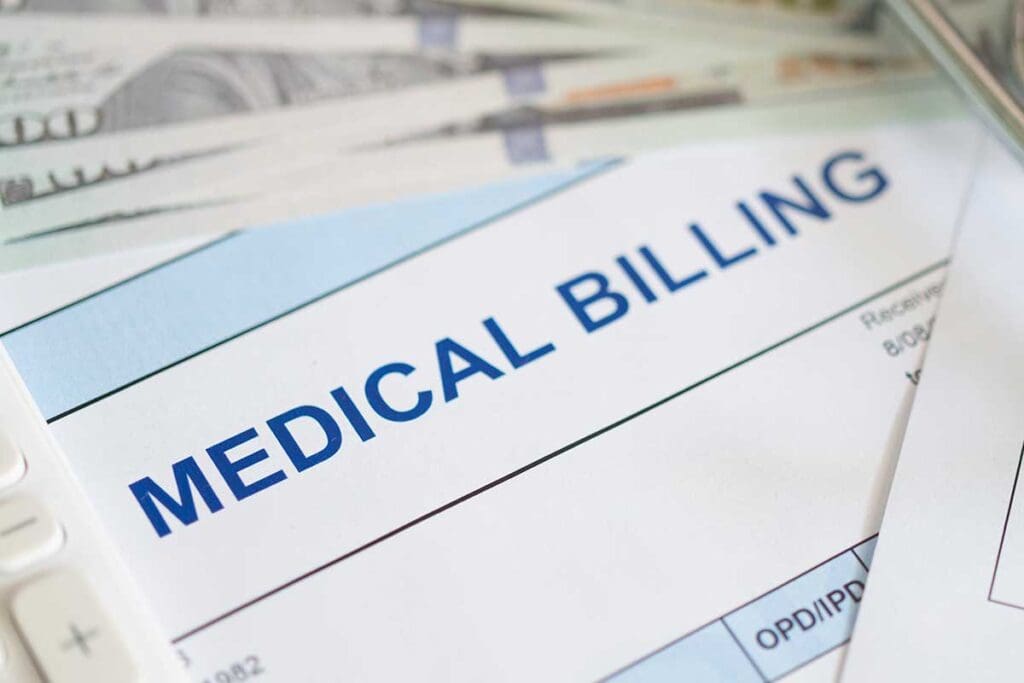Key Takeaways
Medical expenses can include emergency care, hospitalization, medications, therapy, and long-term treatment.
Insurance coverage, including health insurance, auto insurance, and MedPay, plays a critical role in covering medical costs.
Liability and fault influence whether the at-fault party’s insurance will cover your bills.
Out-of-pocket payments may be required initially, but compensation can be sought through claims or lawsuits.
Consulting a personal injury attorney can help maximize your recovery and ensure that medical bills are properly addressed.
Understanding Medical Bills After an Accident
When you’re injured in an accident, medical bills can quickly become overwhelming. These costs include not only emergency care but also follow-up visits, physical therapy, medications, and possibly long-term care. Understanding how these expenses are handled is critical to managing your financial recovery.
Common Medical Expenses After an Accident
- Emergency Care:
- Ambulance services.
- ER visits, including diagnostic tests like X-rays or MRIs.
- Hospitalization: Surgeries, intensive care, or extended stays.
- Ongoing Treatment: Physical therapy, occupational therapy, or chiropractic care.
- Medications and Medical Devices: Prescription drugs, crutches, braces, or prosthetics.
- Specialized Care: Psychological counseling for trauma or pain management for chronic issues.
Who Pays for Medical Bills?
Determining who is responsible for medical bills depends on several factors, including the type of accident, insurance coverage, and fault.
1. Health Insurance
Your health insurance is often the first line of defense for covering medical expenses after an accident. Most health insurance policies cover:
- Emergency room visits.
- Hospital stays.
- Follow-up treatments and rehabilitation.
Important Notes:
- You may still be responsible for deductibles, co-pays, or out-of-network charges.
- Health insurers often seek reimbursement from any settlement or judgment you receive through a process called subrogation.
2. Auto Insurance
If the accident involved a vehicle, auto insurance policies play a significant role in covering medical expenses. This can include:
- MedPay (Medical Payments Coverage): Covers medical expenses for you and your passengers regardless of fault.
- PIP (Personal Injury Protection): Required in some states, it covers medical expenses, lost wages, and other costs up to policy limits.
- Liability Insurance: If another driver is at fault, their liability coverage may pay for your medical expenses.
Key Considerations:
- PIP and MedPay coverage may be limited and not cover all expenses.
- Liability insurance only pays after fault is established, which can delay compensation.
3. Workers’ Compensation
For workplace injuries, workers’ compensation insurance typically covers:
- Medical expenses related to the injury.
- Lost wages during recovery.
- Ongoing care, such as therapy or rehabilitation.
Important Notes:
- Workers’ compensation is a no-fault system, meaning you can receive benefits regardless of who caused the accident.
- You cannot typically sue your employer unless gross negligence is involved.
4. The At-Fault Party
If someone else’s negligence caused your accident, their insurance or personal assets might be used to cover your medical bills. This could include:
- Liability insurance for auto accidents.
- Property insurance for slip-and-fall injuries.
- Business liability insurance for accidents on commercial properties.
Challenges:
- Establishing fault can take time, delaying payments.
- Insurance companies may dispute liability or offer low settlements.
Steps to Take After an Accident
To ensure your medical bills are addressed, follow these steps:
1. Seek Immediate Medical Attention
- Always prioritize your health and safety.
- Document all treatments, diagnoses, and medical advice.
- Save receipts and bills for every expense.
2. Notify Your Insurance Company
- Report the accident to your health and auto insurance providers as soon as possible.
- Provide basic details but avoid discussing fault without consulting an attorney.
3. Keep Detailed Records
- Organize all medical records, bills, and receipts in one place.
- Track out-of-pocket expenses, including co-pays, deductibles, and transportation costs.
4. Determine Fault
- Work with your attorney to establish liability and gather evidence, such as police reports, photos, and witness statements.
Dealing with Out-of-Pocket Costs
While waiting for insurance claims or settlements to process, you may need to pay some expenses out of pocket. These can include:
- Deductibles and co-pays for health insurance.
- Medications and medical devices.
- Non-covered treatments, such as alternative therapies.
Reimbursement Options
- Document all out-of-pocket costs and include them in your claim.
- Your attorney can ensure these expenses are accounted for in any settlement or lawsuit.
Subrogation: Reimbursing Your Insurer
If your health insurance covers your medical bills, they may have the right to recover those costs from your settlement or judgment.
What You Need to Know
- Subrogation clauses are common in health insurance policies.
- Your attorney can negotiate with your insurer to reduce the amount they recover, ensuring you keep more of your settlement.
Legal Options for Covering Medical Bills
If insurance coverage is insufficient or disputed, you may need to pursue legal action to recover your medical expenses.
1. Filing a Personal Injury Claim
- File a claim against the at-fault party’s insurance company.
- Include all medical bills, future treatment costs, and non-economic damages like pain and suffering.
2. Negotiating a Settlement
- Most personal injury cases are resolved through settlements. Your attorney will negotiate on your behalf to ensure your medical bills and other damages are fully covered.
3. Filing a Lawsuit
- If a fair settlement cannot be reached, your attorney may file a lawsuit.
- Court-awarded damages can cover medical expenses, lost income, and additional compensation for pain and suffering.
Protecting Your Rights
Dealing with medical bills after an accident can be stressful, but understanding your rights can help you navigate the process.
- You Have the Right to Seek Medical Treatment: Insurance companies cannot force you to delay or forego necessary care.
- You Are Entitled to Compensation: If someone else caused your accident, you have the right to seek reimbursement for medical expenses and other damages.
- You Can Challenge Denied Claims: If your insurer denies coverage, consult an attorney to appeal the decision or explore other options.
How an Attorney Can Help
A personal injury attorney can provide invaluable support in managing medical bills and pursuing compensation. They can:
- Handle communications with insurance companies to ensure claims are processed correctly.
- Negotiate settlements that fully account for your medical expenses and future care needs.
- Represent you in court if necessary to secure fair compensation.
Conclusion
Medical bills after an accident can be overwhelming, but understanding your options and rights is key to managing these expenses effectively. From health and auto insurance to personal injury claims, multiple pathways exist to ensure your medical costs are covered. Taking proactive steps, such as documenting expenses and consulting a personal injury attorney, can help you navigate the process and secure the compensation you deserve.







